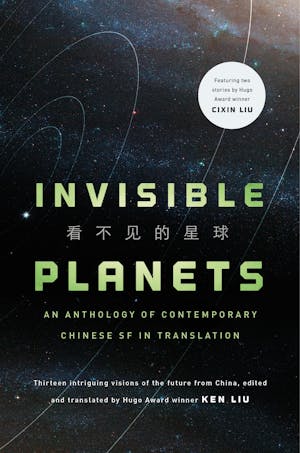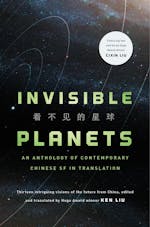INTRODUCTION: CHINA DREAMS
by Ken Liu
This anthology collects a selection of short speculative fiction from China that I’ve translated over the years into one volume. Some have won awards in the United States, some have been selected for inclusion in various “Year’s Best” anthologies, some have been well reviewed by critics and readers, and some are simply my personal favorites.
China has a vibrant, diverse science fiction culture, but few stories are translated into English, making it hard for non-Chinese readers to appreciate them. I hope this anthology can serve as an introduction for the Anglophone reader.
The phrase “China Dreams” is a play on President Xi Jingping’s1 promotion of the “Chinese Dream” as a slogan for China’s development. Science fiction is the literature of dreams, and texts concerning dreams always say something about the dreamer, the dream interpreter, and the audience.
Whenever the topic of Chinese science fiction comes up, Anglophone readers ask, “How is Chinese science fiction different from science fiction written in English?”
I usually disappoint them by replying that the question is ill-defined … and there isn’t a neat sound bite for an answer. Any broad literary classification tied to a culture—especially a culture as in flux and contested as contemporary China’s—encompasses all the complexities and contradictions in that culture. Attempts to provide neat answers will only result in broad generalizations that are of little value, or stereotypes that reaffirm existing prejudices.
To start with, I don’t believe that “science fiction written in English” is a useful category for comparison (the fiction written in Singapore, the United Kingdom, and the United States are all quite different, and there are further divisions within and across such geographical boundaries), and so I wouldn’t even know what baseline I’m supposed to be distinguishing “Chinese science fiction” from.
Moreover, imagine asking a hundred different American authors and critics to characterize “American science fiction”—you’d hear a hundred different answers. The same is true of Chinese authors and critics and Chinese science fiction.
Even within the limited selection of this anthology, you’ll encounter the “science fiction realism” of Chen Qiufan, the “porridge SF” of Xia Jia, the overt, wry political metaphors of Ma Boyong, the surreal imagery and metaphor-driven logic of Tang Fei, the dense, rich language-pictures painted by Cheng Jingbo, the fabulism and sociological speculation of Hao Jingfang, and the grand, hard-science-fictional imagination of Liu Cixin. This should give a hint of the broad range of the science fiction written in China. Faced with such variety, I think it is far more useful and interesting to study the authors as individuals and to treat their works on their own terms rather than to try to impose a preconceived set of expectations on them because they happen to be Chinese.
This is all a rather long-winded way of saying that I think anyone who confidently asserts a definitive characterization of “Chinese science fiction” is either a) an outsider who doesn’t know what they’re talking about or b) someone who does know something, but is deliberately ignoring the contested nature of the subject and presenting their opinion as fact.
So I will state right up front that I do not consider myself an expert on Chinese science fiction. I know enough to know that I don’t know much. I know enough to know that I need to study more—a lot more. And I know enough to know that there are no simple answers.2
China is going through a massive social, cultural, and technological transformation involving more than a billion people of different ethnicities, cultures, classes, and ideological sympathies, and it is impossible for anyone—even people who are living through these upheavals—to claim to know the entire picture. If one’s knowledge of China is limited to Western media reports or the experience of being a tourist or expat, claiming to “understand” China is akin to a man who has caught a glimpse of a fuzzy spot through a drinking straw claiming to know what a leopard is. The fiction produced in China reflects the complexity of the environment.
Given the realities of China’s politics and its uneasy relationship with the West, it is natural for Western readers encountering Chinese science fiction to see it through the lens of Western dreams and hopes and fairy tales about Chinese politics. “Subversion” in the pro-West sense may become an interpretive crutch. It is tempting, for example, to view Ma Boyong’s “The City of Silence” as a straightforward attack on China’s censorship apparatus, or to read Chen Qiufan’s “The Year of the Rat” only as criticism of China’s education system and labor market, or even to reduce Xia Jia’s “A Hundred Ghosts Parade Tonight” to a veiled metaphor for China’s eminent domain policies in the service of state-driven development.
I would urge the reader to resist such temptation. Imagining that the political concerns of Chinese writers are the same as what the Western reader would like them to be is at best arrogant and at worst dangerous. Chinese writers are saying something about the globe, about all of humanity, not just China, and trying to understand their works through this perspective is, I think, the far more rewarding approach.
It is true that there is a long tradition in China of voicing dissent and criticism through the use of literary metaphor; however, this is but one of the purposes for which writers write and for which readers read. Like writers everywhere, today’s Chinese writers are concerned with humanism; with globalization; with technological advancement; with tradition and modernity; with disparities in wealth and privilege; with development and environmental preservation; with history, rights, freedom, and justice; with family and love; with the beauty of expressing sentiment through words; with language play; with the grandeur of science; with the thrill of discovery; with the ultimate meaning of life. We do the works a disservice when we neglect these things and focus on geopolitics alone.
Despite the diversity of approaches and subjects and styles, the authors and stories collected in this anthology represent but a thin slice of the contemporary Chinese science fiction landscape. Though I’ve tried to balance the selection to reflect a range of viewpoints, I’m aware of the narrowness of my scope. Most of the authors collected here (with the exception of Liu Cixin) belong to the younger generation of “rising stars” rather than the generation of established, prominent figures such as Liu Cixin, Han Song, or Wang Jinkang. Most of them are graduates of China’s most elite colleges and work in highly regarded professions. Moreover, I’ve focused on award-winning authors and stories rather than popular fiction published on the web, and I’ve prioritized works which I think are more accessible in translation than works requiring a deeper understanding of Chinese culture and history. These biases and omissions are necessary, but not ideal; the reader should thus be cautious about any conclusions they may draw from the stories here being “representative.” My fondest hope is that each story here at least adds a layer to the reader’s understanding and awareness of a literary tradition different from the one they might be used to.
To round out the collection and provide a more comprehensive overview of Chinese science fiction, I’ve included three essays at the end of the book by Chinese authors and scholars. Liu Cixin’s essay, “The Worst of All Possible Universes and the Best of All Possible Earths,” gives a historical overview of the genre in China and situates his own rise to prominence as the premier Chinese science fiction author within that context. Chen Qiufan’s “The Torn Generation” gives the view of a younger generation of authors trying to come to terms with the tumultuous transformations around them. Finally, the essay by Xia Jia, who holds the first Ph.D. degree issued for a specialization in the study of Chinese science fiction, “What Makes Chinese Science Fiction Chinese?”, offers a starting point for academic analysis of this body of work.
* * *
Noted translator William Weaver compared translation to a performing art. I like that metaphor. When doing a translation, I’m engaging in a cultural and linguistic performance, an attempt to re-create an artifact in a new medium. It is a humbling and thrilling experience.
I feel incredibly privileged to have had the chance to work with the authors in this anthology. In many instances, what began as professional collaboration has turned into personal friendship. From them I’ve learned much not just about translation, but also about writing fiction and living life across the boundaries of cultures and languages. I’m grateful that they entrusted their work to me.
I hope you enjoy the result.
Copyright © 2016 by Ken Liu





